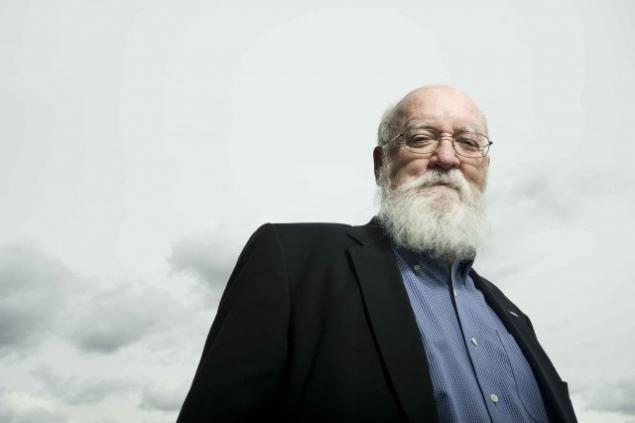1102
What is the "free will", and whether it is a person
Philosophical besedaSchitaetsya that the freedom of the will - an integral part of human nature. The problem is that it is not always true. Daniel Dennett famous philosopher explains why free will - the phenomenon is much more complex than many people think. Interviews conducted by David Edmonds and Nigel Warburton.

Nigel Warburton (H): The theme on which we focus - "Freedom, which is willing to." This is a very strange conversation. It is generally the discussion of free will relate to whether it is general, and not whether to choose it. Describe to us your point of view.
Daniel Dennett (D): I came to the conclusion that many of the problems will raised by philosophers, really do not matter, no matter. There is no more curious and interesting topics for people than the freedom of the will, but the philosophers substitute for her metaphysical questions or technical problems. Who cares? We can identify many types of free will, that you do not have or are not compatible with determinism (the concept of causation). Well, so what?
The question is: do we need all the free will? Would we regret having lost it?
H: The classic description of the problem is this: "If we can explain every action of a causal link, the room for free will simply does not remain." What is wrong with this description?
A: It is absolutely wrong. There is always room for free will: determinism and free will at all, oddly enough, perfectly aligned. However, in a society taking too simplistic idea of causation. People think that if you are at the lowest level explain everything, literally atom by atom, you get a full understanding of the causation of the phenomenon. In fact it is not, it's not even a causal link, in a sense.
H: How is "simplistic idea"? For example, the billiard balls on the table, one ball hits the second, resulting in a second movement begins. None of the balls do not choose whether you want it to move, and their trajectories defines physics.
A: Yes, but in your example ignores all forms of causality of a higher level, that are just as real and just as important. Let's assume that you have a detailed, literally atom by atom, the history of each giraffe that ever lived, plus a history of all the ancestors of the giraffe. Then you do not have to answer the question why giraffes have long necks. This really is a causal explanation, it's just lost a huge amount of detail. And you have to go to another level of causality in order to explain how the giraffe got its long neck. Such an understanding of causality is important, when it comes to free agency.
H: So how did the giraffe get its long neck?
A: It is believed that the giraffe and his ancestors got their long necks to have an advantage over those who have a short neck. That is the explanation. But if it is true? It is - still an open question.
Perhaps the obvious explanation is that giraffes got long necks to reach leaves on high altitude is not the best. It may be that the long neck giraffes evolved to it was easier to drink, standing on long legs. A long legs appeared because they are easier to fend off lions.

H: So, another evolutionary hypothesis about the neck of a giraffe. And how it is linked with the debate about free will?
Q: If I want to know why you pulled the trigger, I do not know, even if I'll have a detailed, atom by atom, just report what was going on in your mind at that moment. I'll have to go to a higher level: to turn to psychology.
Here's a simple analogy: in your hands calculator, you do some arithmetic operation and see the answer: 3 333333E. Why is this happening? Because if you divide, for example, ten to three, the number of threes after the decimal point will tend to infinity, so that the calculator instead put "E».
Now, if you want to understand in what circumstances this occurs, you do not need a calculator to learn every single transistor. Better use of arithmetic. The arithmetic will tell you, in which cases the display will show "E". You will not be able to answer the question "E" with the help of electronics: it is not the level. Much the same applies to the game of chess with the computer. Why does my computer moved his bishop? Because otherwise it would hurt his queen. This - the level at which and must answer this question.
H: We are often interested in the person's intentions when it is related to legal or moral responsibility. And in some cases, much depends on the information about the human brain that we receive. For example, there are cases where brain damage a person is a causal influence on his criminal behavior.
A: I am very glad that you raised this issue, because it perfectly illustrates the profound cognitive illusion, which is rooted in the minds of a whole generation.
People say, "We can not bring to justice human violations in the brain, it would be wrong." But exactly what kind of abuse we say?
You'll never see descriptions of disturbances in the brain, for example, a successful businessman and well-known philanthropist, or, say, an outstanding scientist. When we talk about "brain disorders", we always talk about it in a negative way.
Suppose you were to look at the brilliant mind of Andrew Wiles and get a perfect physiological description of how he proved Fermat's theorem. Will this mean that Wiles is not responsible for this evidence? Of course, no. Because we do not require a detailed description of the physiological any event, if the event - right.
H: I'd like to understand exactly what is the "intention." Usually we think of intent as certain introspective mental events that precede action. But it seems to be not quite what you mean by the word "intention».
Q: When are discussed so-called "intentional setting", the word "intent" acquires a broader meaning. This applies to states with a certain content. Among these states - beliefs, desires and intentions. Take intentional setting can be in relation to a person (usually the case), but it may be a cat, or even a computer with which you play chess. You must allow for the possibility that you are dealing with something that has a certain desire and conviction, something that decides what to do, and what his intentions are formed on the basis of a rational assessment of its beliefs and desires. This - a position that dominates the theory of games.
Robinson Crusoe on a desert island does not require any intentional attitudes. But if the environment there is something, what have the intention (or something that you are considering as such an object) - it changes the rules of the game have to worry about feedback. If you plan your actions, then you have to think, "If I do this, this object might think that he do in response. And what, then, is my response to that »?
Robinson Crusoe was not necessary to be afraid to walk on tiptoe in their garden, worrying about what will make it sprouts, seeing that he came.
H: But there Friday, and the problems begin ...
Q: If there was Friday, then you need the intentional setting.
H: So if we have a difficulty in interaction (which is characteristic of intentional systems), this is sufficient for the emergence of intentions. If so, it seems that for the error of anthropomorphism simply no place. If the situation is quite complicated, the anthropomorphism - it's just the right attitude to some things.
A: We can see the tree in terms of the intentional setting, and think about what it needs, what it wants, and that it can take in order to get what he wants. It works. Up to a certain point. But of course, the tree has no soul. And his actions are unconscious.
However, there are certain patterns and reactions. We recently learned that certain trees have the ability that gives them quasi-color vision. When the trees are falling light reflected from objects predominantly green, they begin to spend more energy on growth. We can say that the trees sense of competition, and taking reasonable measures to overtake competitors.
So, this is - a classic example of intentional setting in relation to the tree.
We are different in that not only do something for some reason. So do trees. We imagine the reasons why we think of them, and the idea to imagine and reflect on the reasons for them just manages our intentional setting.
We grow and learn to share your reasons with our friends and family. And then we can direct this perspective on the evolutionary history, artifacts, into the trees. And then we can see the reasons are not obvious, but still active. As long as you do not get the level of perspective, which allows to see the reasons why you can not see, and free will. And you never - never - be able to see at the atomic level difference between organisms having free will, and the body without it. You have to go to a different level of perception.

H: So we can take a certain intential attitude toward chess computer, and it's likely we'll do it because we want to win the game, but this does not mean that it has received free will?
D: Only creatures with free will can be intential systems. We say "free as a bird," and the birds do have a certain kind of freedom of will.
Here are just a freewill birds - nothing compared with our free will, because the birds do not have the cognitive system to anticipate their expectations and reflect on them. Also, it does not have a specific projection of the future, what we have. And she, of course, can not be anyone of anything convincing. One bird never tells the other what to do.
H: So let's go back to the original topic. Freedom of will is much to be what kind of?
A: It should be the kind of freedom of the will, which gives us political freedom to move in a state governed by law, and do what we go to do. Not everyone has such freedom. This is a great value.
A more useful to you several abilities. You should be able to recognize the good intentions of others to control you, and you need to be able to reflect such manipulation attempts. The main thing that is required of a free man with high morals - it should not be someone's puppet. And to reflect attempts to manipulate, you have to be unpredictable. To help in this, for example, can completely inscrutable face. If you can not hide your inner state, when you go into an antique store, for example, then you are ready to be deceived, you are preparing to be manageable. If you can not hide their beliefs and desires of others, you will become a defective element with disabilities. To get the most out of life, you should not tell people what exactly you want.
H: This is a very cynical view of human nature. There is an alternative point of view, of course, according to which an open demonstration of what you feel, allowing others to better understand who you are actually there.
A: Yes, there is. But let's look at the process of courtship. Here you see a woman, and you realize that fell in love with her without memory. The worst thing you can do in this situation - is to begin to pursue it, and in every way to show her that you love.
At first you'll probably scare her. Either she saw a demonstration of your passion, you will want to begin to manipulate.
If you do not want it - it is not necessary to show all at once. Talleyrand, French politician, once said that God gave people the language so that they could hide their thoughts from each other. I believe this is a very profound observation of the role that language plays in communication. It is important to understand that communication - an intentional act in which it is you decide what aspects of his inner world, you want to inform others, and about what - no.
H: So, the most important kind of freedom, which is to desire, is the freedom from having to manipulate you. In fact - it is the control of your own life in which you are free to decide to do something, and do not the things that have chosen for you by someone else, so?
A: Yes. To be completely independent, in the strict sense of the word, and to maintain self-control, we should be sure that we do not manage others. With this approach, the environment - is no longer an object that tries to control us. There are only people who are trying to manipulate us. And it is very important to keep them at a distance, because the only way we can be independent. And in order to do this, we must have the ability to surprise.
via factroom.ru

Nigel Warburton (H): The theme on which we focus - "Freedom, which is willing to." This is a very strange conversation. It is generally the discussion of free will relate to whether it is general, and not whether to choose it. Describe to us your point of view.
Daniel Dennett (D): I came to the conclusion that many of the problems will raised by philosophers, really do not matter, no matter. There is no more curious and interesting topics for people than the freedom of the will, but the philosophers substitute for her metaphysical questions or technical problems. Who cares? We can identify many types of free will, that you do not have or are not compatible with determinism (the concept of causation). Well, so what?
The question is: do we need all the free will? Would we regret having lost it?
H: The classic description of the problem is this: "If we can explain every action of a causal link, the room for free will simply does not remain." What is wrong with this description?
A: It is absolutely wrong. There is always room for free will: determinism and free will at all, oddly enough, perfectly aligned. However, in a society taking too simplistic idea of causation. People think that if you are at the lowest level explain everything, literally atom by atom, you get a full understanding of the causation of the phenomenon. In fact it is not, it's not even a causal link, in a sense.
H: How is "simplistic idea"? For example, the billiard balls on the table, one ball hits the second, resulting in a second movement begins. None of the balls do not choose whether you want it to move, and their trajectories defines physics.
A: Yes, but in your example ignores all forms of causality of a higher level, that are just as real and just as important. Let's assume that you have a detailed, literally atom by atom, the history of each giraffe that ever lived, plus a history of all the ancestors of the giraffe. Then you do not have to answer the question why giraffes have long necks. This really is a causal explanation, it's just lost a huge amount of detail. And you have to go to another level of causality in order to explain how the giraffe got its long neck. Such an understanding of causality is important, when it comes to free agency.
H: So how did the giraffe get its long neck?
A: It is believed that the giraffe and his ancestors got their long necks to have an advantage over those who have a short neck. That is the explanation. But if it is true? It is - still an open question.
Perhaps the obvious explanation is that giraffes got long necks to reach leaves on high altitude is not the best. It may be that the long neck giraffes evolved to it was easier to drink, standing on long legs. A long legs appeared because they are easier to fend off lions.

H: So, another evolutionary hypothesis about the neck of a giraffe. And how it is linked with the debate about free will?
Q: If I want to know why you pulled the trigger, I do not know, even if I'll have a detailed, atom by atom, just report what was going on in your mind at that moment. I'll have to go to a higher level: to turn to psychology.
Here's a simple analogy: in your hands calculator, you do some arithmetic operation and see the answer: 3 333333E. Why is this happening? Because if you divide, for example, ten to three, the number of threes after the decimal point will tend to infinity, so that the calculator instead put "E».
Now, if you want to understand in what circumstances this occurs, you do not need a calculator to learn every single transistor. Better use of arithmetic. The arithmetic will tell you, in which cases the display will show "E". You will not be able to answer the question "E" with the help of electronics: it is not the level. Much the same applies to the game of chess with the computer. Why does my computer moved his bishop? Because otherwise it would hurt his queen. This - the level at which and must answer this question.
H: We are often interested in the person's intentions when it is related to legal or moral responsibility. And in some cases, much depends on the information about the human brain that we receive. For example, there are cases where brain damage a person is a causal influence on his criminal behavior.
A: I am very glad that you raised this issue, because it perfectly illustrates the profound cognitive illusion, which is rooted in the minds of a whole generation.
People say, "We can not bring to justice human violations in the brain, it would be wrong." But exactly what kind of abuse we say?
You'll never see descriptions of disturbances in the brain, for example, a successful businessman and well-known philanthropist, or, say, an outstanding scientist. When we talk about "brain disorders", we always talk about it in a negative way.
Suppose you were to look at the brilliant mind of Andrew Wiles and get a perfect physiological description of how he proved Fermat's theorem. Will this mean that Wiles is not responsible for this evidence? Of course, no. Because we do not require a detailed description of the physiological any event, if the event - right.
H: I'd like to understand exactly what is the "intention." Usually we think of intent as certain introspective mental events that precede action. But it seems to be not quite what you mean by the word "intention».
Q: When are discussed so-called "intentional setting", the word "intent" acquires a broader meaning. This applies to states with a certain content. Among these states - beliefs, desires and intentions. Take intentional setting can be in relation to a person (usually the case), but it may be a cat, or even a computer with which you play chess. You must allow for the possibility that you are dealing with something that has a certain desire and conviction, something that decides what to do, and what his intentions are formed on the basis of a rational assessment of its beliefs and desires. This - a position that dominates the theory of games.
Robinson Crusoe on a desert island does not require any intentional attitudes. But if the environment there is something, what have the intention (or something that you are considering as such an object) - it changes the rules of the game have to worry about feedback. If you plan your actions, then you have to think, "If I do this, this object might think that he do in response. And what, then, is my response to that »?
Robinson Crusoe was not necessary to be afraid to walk on tiptoe in their garden, worrying about what will make it sprouts, seeing that he came.
H: But there Friday, and the problems begin ...
Q: If there was Friday, then you need the intentional setting.
H: So if we have a difficulty in interaction (which is characteristic of intentional systems), this is sufficient for the emergence of intentions. If so, it seems that for the error of anthropomorphism simply no place. If the situation is quite complicated, the anthropomorphism - it's just the right attitude to some things.
A: We can see the tree in terms of the intentional setting, and think about what it needs, what it wants, and that it can take in order to get what he wants. It works. Up to a certain point. But of course, the tree has no soul. And his actions are unconscious.
However, there are certain patterns and reactions. We recently learned that certain trees have the ability that gives them quasi-color vision. When the trees are falling light reflected from objects predominantly green, they begin to spend more energy on growth. We can say that the trees sense of competition, and taking reasonable measures to overtake competitors.
So, this is - a classic example of intentional setting in relation to the tree.
We are different in that not only do something for some reason. So do trees. We imagine the reasons why we think of them, and the idea to imagine and reflect on the reasons for them just manages our intentional setting.
We grow and learn to share your reasons with our friends and family. And then we can direct this perspective on the evolutionary history, artifacts, into the trees. And then we can see the reasons are not obvious, but still active. As long as you do not get the level of perspective, which allows to see the reasons why you can not see, and free will. And you never - never - be able to see at the atomic level difference between organisms having free will, and the body without it. You have to go to a different level of perception.

H: So we can take a certain intential attitude toward chess computer, and it's likely we'll do it because we want to win the game, but this does not mean that it has received free will?
D: Only creatures with free will can be intential systems. We say "free as a bird," and the birds do have a certain kind of freedom of will.
Here are just a freewill birds - nothing compared with our free will, because the birds do not have the cognitive system to anticipate their expectations and reflect on them. Also, it does not have a specific projection of the future, what we have. And she, of course, can not be anyone of anything convincing. One bird never tells the other what to do.
H: So let's go back to the original topic. Freedom of will is much to be what kind of?
A: It should be the kind of freedom of the will, which gives us political freedom to move in a state governed by law, and do what we go to do. Not everyone has such freedom. This is a great value.
A more useful to you several abilities. You should be able to recognize the good intentions of others to control you, and you need to be able to reflect such manipulation attempts. The main thing that is required of a free man with high morals - it should not be someone's puppet. And to reflect attempts to manipulate, you have to be unpredictable. To help in this, for example, can completely inscrutable face. If you can not hide your inner state, when you go into an antique store, for example, then you are ready to be deceived, you are preparing to be manageable. If you can not hide their beliefs and desires of others, you will become a defective element with disabilities. To get the most out of life, you should not tell people what exactly you want.
H: This is a very cynical view of human nature. There is an alternative point of view, of course, according to which an open demonstration of what you feel, allowing others to better understand who you are actually there.
A: Yes, there is. But let's look at the process of courtship. Here you see a woman, and you realize that fell in love with her without memory. The worst thing you can do in this situation - is to begin to pursue it, and in every way to show her that you love.
At first you'll probably scare her. Either she saw a demonstration of your passion, you will want to begin to manipulate.
If you do not want it - it is not necessary to show all at once. Talleyrand, French politician, once said that God gave people the language so that they could hide their thoughts from each other. I believe this is a very profound observation of the role that language plays in communication. It is important to understand that communication - an intentional act in which it is you decide what aspects of his inner world, you want to inform others, and about what - no.
H: So, the most important kind of freedom, which is to desire, is the freedom from having to manipulate you. In fact - it is the control of your own life in which you are free to decide to do something, and do not the things that have chosen for you by someone else, so?
A: Yes. To be completely independent, in the strict sense of the word, and to maintain self-control, we should be sure that we do not manage others. With this approach, the environment - is no longer an object that tries to control us. There are only people who are trying to manipulate us. And it is very important to keep them at a distance, because the only way we can be independent. And in order to do this, we must have the ability to surprise.
via factroom.ru























